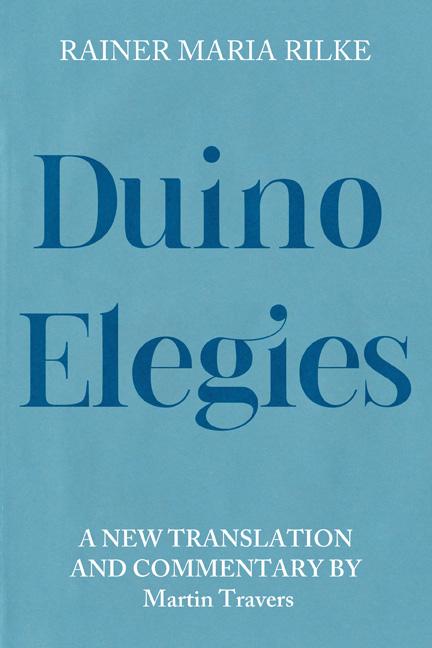Introduction
Published online by Cambridge University Press: 10 January 2024
Summary
Genesis and Background
For those who believe that the poetic voice speaks with a depth of its own, Rilke's Duino Elegies have remained the ultima Thule. They have spoken to successive generations since their publication in 1923, drawing readers such as Andre Gide, Paul Valery, and W. H. Auden into their chiaroscuro depths. The Austrian playwright, Hugo von Hofmannsthal, was among many who praised the radical novelty of the Elegies, “for these descriptive transcendental poems of his middleperiod are really something, something rare and special in the German language” (Materialien III, 180). Hermann Hesse saw the Elegies as revealing an authenticity within us, something that draws upon “our own pain and our own dreams, the world of images, and continues to open the world of the soul, the world of experience” (Materialien III, 185). For the young Klaus Mann, son of Thomas, it was precisely this fusion of diverging forms of poetic discourse that constituted the greatest achievement of the Elegies: for they have been “purged of all that is only artistic. What has now been ventured is the most intense spiritualization of poetry, which is combined here with its most intense sensuality.” Above all, Mann was drawn to the distinctive voice of the Elegies, its lyrical subject: “Rilke addresses the Angels throughout; he pays homage to them, to those who are both feared and loved … he, who must sing, stands yet again tragically between inanimate Creation and the Angel; in his voice is inconsolable melancholy … but a melancholy from which all rancor has been lifted” (Materialien III, 170 and 171). T. S. Eliot, who also looked for gold in the dross of modernity and, perhaps seeing formal and thematic affinities between the Elegies and his The Wasteland, recognized Rilke as a soul companion: “I cannot read any more of him without having to fear that my own thoughts will be disrupted by the immediate affinity that binds me to him” (Materialien III, 248).
- Type
- Chapter
- Information
- Duino ElegiesA New Translation and Commentary, pp. 1 - 26Publisher: Boydell & BrewerPrint publication year: 2023

